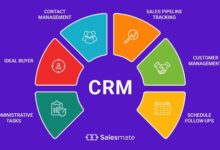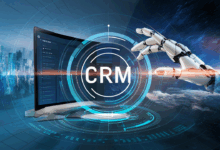Best Enterprise CRM Solutions: Streamlining Business Operations With CRM Technology
Best Enterprise CRM Solutions encompass a range of powerful tools and strategies designed to optimize business processes and enhance customer relationships. From data analytics to integration capabilities, these solutions are tailored to meet the specific needs of large organizations, driving efficiency and growth in today’s competitive market.
Importance of Enterprise CRM Solutions
Customer Relationship Management (CRM) solutions are crucial for large businesses as they play a vital role in managing interactions with customers, improving business relationships, and driving sales growth. These systems are specifically designed to meet the complex needs of enterprises and enhance overall operational efficiency.
Significance of CRM Solutions in Enterprise Operations
- CRM systems benefit enterprise operations by centralizing customer data, enabling personalized interactions, and streamlining communication across departments.
- They help businesses understand customer behavior, preferences, and trends, facilitating targeted marketing campaigns and improved customer retention strategies.
- CRM solutions also enhance collaboration among sales, marketing, and customer service teams, leading to better coordination and customer satisfaction.
Key Features Tailored for Enterprise Needs
- Scalability to accommodate a large volume of customer data and interactions.
- Customization options to align with specific business processes and requirements.
- Integration capabilities with other enterprise systems for seamless data flow and analysis.
- Advanced reporting and analytics tools to derive actionable insights and measure performance metrics.
Role of Data Analytics in Optimizing CRM for Large-Scale Businesses
Data analytics plays a crucial role in optimizing CRM for large-scale businesses by providing valuable insights into customer behavior, preferences, and trends. By analyzing data collected through CRM systems, organizations can make informed decisions, identify opportunities for growth, and enhance overall customer experience.
Comparison of Cloud-Based CRM Solutions with On-Premise Options
Cloud-based CRM solutions offer flexibility, scalability, and cost-effectiveness, making them a popular choice for enterprises looking to streamline operations and access real-time data from anywhere. On the other hand, on-premise options provide greater control over data security and customization but may require higher upfront costs and maintenance.
Implementing CRM Solutions in a Large Organization
- Assess business needs and goals to determine the right CRM solution.
- Engage stakeholders from different departments to ensure buy-in and collaboration.
- Choose a reliable CRM vendor and customize the system to align with organizational processes.
- Provide comprehensive training to employees to maximize utilization and adoption of the CRM system.
- Continuously monitor and evaluate CRM performance to make necessary adjustments and improvements.
Challenges in Integrating CRM Systems Across Different Departments
- Lack of communication and alignment between departments leading to data silos and inefficiencies.
- Resistance to change from employees accustomed to existing processes and systems.
- Integration issues with legacy systems and data migration challenges.
- Ensuring data security and compliance with regulations when sharing customer information across departments.
Key Features of Enterprise CRM Solutions
Enterprise CRM solutions offer a wide range of features that cater to the needs of large businesses, distinguishing them from CRM systems designed for smaller companies. These key features help organizations effectively manage customer relationships and drive business growth. Additionally, customization options allow businesses to tailor their CRM software to meet specific requirements.
Scalability
One essential feature of enterprise CRM solutions is scalability, allowing the system to grow alongside the business. Large companies with vast customer databases and complex operations require a CRM system that can handle increasing data volumes and user numbers without compromising performance.
Integration Capabilities
Enterprise CRM solutions often offer robust integration capabilities, allowing seamless connectivity with other business systems such as ERP, marketing automation, and customer support platforms. This integration streamlines processes, enhances data visibility, and provides a holistic view of customer interactions across the organization.
Advanced Analytics
Large businesses benefit from advanced analytics features in enterprise CRM solutions, enabling them to gain valuable insights into customer behavior, trends, and preferences. These analytics help businesses make informed decisions, personalize customer interactions, and optimize marketing strategies for better outcomes.
Customization Options
Enterprise CRM solutions provide extensive customization options, allowing businesses to tailor the software to their unique requirements. From custom fields and workflows to personalized dashboards and reports, customization empowers organizations to configure the CRM system according to their specific needs and processes.
Integration Capabilities
Integration capabilities are crucial for CRM solutions as they allow seamless communication and data sharing between different business systems within an enterprise. This integration enhances the overall efficiency and effectiveness of CRM processes.
Importance of CRM Integration
- Streamlined Data Management: Integrating CRM with other systems like ERP, marketing automation, or help desk software ensures that all customer data is centralized and up-to-date.
- Improved Customer Experience: By integrating CRM with customer support systems, sales teams can access customer interaction history and provide personalized service.
- Enhanced Reporting and Analytics: Integration with business intelligence tools enables better insights into customer behavior and trends for informed decision-making.
Popular Integrations for CRM
- Integration with Email Marketing Platforms: Connecting CRM with email marketing tools allows for targeted email campaigns based on customer data stored in the CRM.
- Integration with E-commerce Platforms: CRM integration with e-commerce systems enables tracking of customer purchases and preferences for personalized marketing strategies.
- Integration with Social Media Platforms: Linking CRM with social media channels helps in monitoring customer interactions and sentiment for improved engagement.
Challenges and Benefits of CRM Integration
Integrating CRM solutions with existing enterprise software can pose challenges such as compatibility issues, data migration complexities, and potential disruptions to workflows. However, the benefits far outweigh the challenges:
- Increased Efficiency: Streamlining processes through integration leads to improved productivity and reduced manual data entry.
- Enhanced Customer Insights: Integration allows for a 360-degree view of customer data, enabling personalized interactions and targeted marketing campaigns.
- Better Collaboration: Integrated systems promote cross-departmental collaboration and communication, leading to a more cohesive approach to customer management.
Scalability of CRM Solutions
In the realm of CRM solutions, scalability refers to the ability of a system to accommodate the growth and changing needs of a business. It is crucial for companies to choose a CRM system that can scale along with their operations to ensure continued efficiency and effectiveness.
Key Factors Contributing to Scalability
- Customization Options: A CRM system should offer a high degree of customization to adapt to unique business processes and requirements.
- Data Handling Capabilities: The system should be able to manage large volumes of data efficiently as the business grows.
- Integration Flexibility: Seamless integration with other business tools and systems is essential for scalability.
- User-friendly Interface: An intuitive interface allows for easy adoption by new users as the company expands.
Role of Cloud-Based CRM Solutions
Cloud-based CRM solutions play a significant role in enabling scalability for businesses of all sizes. By leveraging the cloud, companies can easily scale their CRM systems up or down based on their current needs without the need for significant infrastructure investments.
Assessing Scalability Requirements and Choosing CRM Solutions
Assessing scalability requirements involves evaluating current business processes, anticipated growth, and the ability of the CRM system to adapt to these changes. Here is a step-by-step guide to help in the decision-making process:
- Identify current pain points and areas for improvement in your existing CRM system.
- Forecast future growth and determine the scalability needs of your business.
- Research and compare different CRM solutions based on their scalability features and capabilities.
- Consider factors like customization options, data handling, integration capabilities, and user-friendliness.
- Select a CRM solution that aligns best with your scalability requirements and business objectives.
Comparison Table of Scalability Features in CRM Software
| CRM Software | Customization Options | Data Handling Capabilities | Integration Flexibility | User-Friendly Interface |
|---|---|---|---|---|
| Software A | High | Excellent | Seamless | Intuitive |
| Software B | Moderate | Good | Moderate | User-Friendly |
| Software C | Low | Basic | Limited | Complex |
Data Security and Compliance
Data security and compliance are crucial aspects when it comes to handling sensitive enterprise data in CRM systems. Let’s delve into the security measures, compliance regulations, and how CRM software helps maintain data privacy and security for large organizations.
Security Measures for Handling Sensitive Data
- Encryption: Utilizing encryption techniques to protect data both in transit and at rest.
- Access Controls: Implementing role-based access controls to ensure only authorized personnel can view or modify sensitive data.
- Regular Audits: Conducting frequent security audits to identify and address any vulnerabilities in the CRM system.
- Data Backup: Regularly backing up data to prevent data loss in case of security breaches or system failures.
Compliance Regulations for Enterprise CRM Solutions
- GDPR: Adhering to the General Data Protection Regulation to ensure the lawful and transparent processing of personal data.
- HIPAA: Complying with the Health Insurance Portability and Accountability Act to protect the confidentiality and security of healthcare information.
- PCI DSS: Following the Payment Card Industry Data Security Standard for secure handling of payment card data.
- SOC 2: Meeting the Service Organization Control 2 requirements to demonstrate effective security, availability, processing integrity, confidentiality, and privacy controls.
Maintaining Data Privacy and Security with CRM Software
- Role-Based Permissions: Assigning specific access levels to users based on their roles and responsibilities within the organization.
- Audit Trails: Tracking and recording all user activities within the CRM system to ensure accountability and traceability.
- Data Masking: Concealing sensitive data to protect it from unauthorized access or exposure.
- Two-Factor Authentication: Adding an extra layer of security by requiring additional verification beyond the standard username and password.
Customer Support and Training
Customer support and training are crucial components of successful enterprise CRM solutions. Let’s delve into the importance of robust customer support services and various training options available for employees to optimize CRM usage.
Importance of Customer Support Services
Customer support plays a vital role in ensuring that users can effectively utilize CRM solutions to their full potential. Some key reasons why robust customer support is essential include:
- Timely resolution of issues and technical difficulties
- Enhanced user experience and satisfaction
- Continuous guidance and assistance for maximizing CRM benefits
Training Options for CRM Optimization
To optimize CRM usage, employees can benefit from various training options such as:
- On-site training sessions conducted by CRM vendors
- Online tutorials and resources for self-paced learning
- Certification programs to enhance CRM proficiency
Successful Customer Support Strategies
CRM vendors implement successful customer support strategies such as:
- 24/7 multi-channel support (phone, email, chat)
- Knowledge base and FAQ sections for self-help
- Personalized support tailored to individual user needs
Setting up a Comprehensive Customer Support System
To establish a comprehensive customer support system within a CRM platform, follow these steps:
- Identify customer support goals and objectives
- Implement a ticketing system for issue tracking
- Train support staff on CRM functionalities
- Regularly gather feedback for continuous improvement
In-house vs. Outsourced Customer Support Services
The benefits of in-house customer support teams and outsourced services for CRM solutions include:
- In-house teams offer better product knowledge and alignment with company values
- Outsourced services provide cost-effectiveness and scalability
- In-house teams offer quicker response times and personalized support
Key Metrics for Tracking Customer Support Effectiveness
Key metrics to track the effectiveness of customer support services in a CRM system include:
- Average response time to customer queries
- Customer satisfaction ratings and feedback
- Resolution time for support tickets
- Number of repeat support requests
Mobile Access and User Experience
Mobile access is crucial for modern CRM solutions, allowing users to access important customer data on the go. Responsive design plays a key role in optimizing CRM applications for mobile devices, ensuring a seamless user experience across various screen sizes and devices.
Role of Responsive Design
Responsive design enables CRM solutions to adapt to different screen sizes and resolutions, providing an optimal viewing experience for users. By utilizing responsive design techniques, CRM applications can adjust layout, content, and functionality to suit the specific device being used, whether it’s a smartphone, tablet, or desktop.
- Automatically resizing and rearranging content based on screen size
- Intuitive navigation menus for touchscreens
- Optimized form fields and buttons for easier input on mobile devices
- Offline access to cached data for uninterrupted usage
Challenges and Solutions
Integrating mobile access into existing CRM systems can pose challenges such as compatibility issues, data synchronization problems, and security concerns. To address these challenges, organizations can implement APIs for seamless integration, utilize secure authentication methods, and prioritize data encryption to ensure the safety of customer information.
User Adoption Rates
User adoption rates for mobile CRM platforms have been steadily increasing, driven by the convenience and flexibility offered by mobile access. Compared to traditional desktop versions, mobile CRM platforms are seeing higher adoption rates, especially among field sales teams and remote workers who rely on real-time data access to make informed decisions.
Impact of Offline Capabilities
Offline capabilities play a significant role in enhancing user experience in mobile CRM usage, allowing users to access critical data even when they are not connected to the internet. By enabling offline access to cached data, mobile CRM applications ensure that users can continue working seamlessly, regardless of their internet connection status.
Reporting and Analytics Capabilities
In the realm of enterprise CRM solutions, reporting and analytics capabilities play a crucial role in enhancing the effectiveness of customer relationship management for large businesses. By leveraging data-driven insights, organizations can make informed decisions, optimize processes, and ultimately drive growth and profitability.
Advanced Analytics Features
- Advanced analytics features in enterprise CRM solutions enable businesses to delve deep into customer data, identify trends, patterns, and anomalies, and gain valuable insights for strategic decision-making.
- These features often include predictive analytics, machine learning algorithms, and data visualization tools that empower organizations to forecast customer behavior, personalize interactions, and improve overall customer satisfaction.
Setting Up KPIs in CRM Systems
- Setting up key performance indicators (KPIs) in CRM systems is essential to measure business performance accurately.
- By defining and tracking KPIs such as customer acquisition cost, customer lifetime value, and customer retention rate, organizations can assess the effectiveness of their CRM strategies and make data-driven decisions to drive business growth.
Data Visualization Tools
- Data visualization tools play a crucial role in presenting CRM analytics results in a visually appealing and easy-to-understand format.
- With interactive dashboards, charts, and graphs, decision-makers can quickly grasp insights, trends, and patterns, enabling them to take timely actions to improve customer relationships and drive business success.
Predictive Analytics and A/B Testing
- Predictive analytics in CRM allows organizations to forecast customer behavior, anticipate future trends, and proactively tailor marketing campaigns and customer interactions to meet evolving needs and preferences.
- A/B testing, on the other hand, enables businesses to experiment with different strategies, messages, or offers, analyze the results, and optimize marketing efforts based on data-driven insights.
Real-Time Reporting Capabilities
- Real-time reporting capabilities in CRM systems provide organizations with immediate access to up-to-date data, enabling quick decision-making and agile responses to changing market conditions and customer needs.
- By leveraging real-time insights, businesses can identify opportunities, address challenges, and stay ahead of the competition in today’s dynamic business landscape.
Cost and ROI Considerations
When it comes to implementing enterprise CRM solutions, analyzing the total cost of ownership and understanding the return on investment (ROI) are crucial factors for large enterprises. Let’s delve into the considerations that play a significant role in the cost and ROI of CRM investments.
Total Cost of Ownership
Implementing enterprise CRM solutions involves various costs beyond the initial purchase price. These costs may include licensing fees, customization, integration with existing systems, training, maintenance, and support. It’s essential to consider these factors to determine the total cost of ownership accurately.
- License fees
- Integration costs
- Training expenses
- Maintenance and support fees
Factors Contributing to ROI
The ROI of CRM investments in large enterprises can be influenced by factors such as increased sales productivity, improved customer satisfaction, streamlined processes, enhanced marketing effectiveness, and better data management. Successful CRM implementations can lead to significant returns for organizations.
- Increased sales productivity
- Improved customer satisfaction
- Streamlined processes
- Enhanced marketing effectiveness
- Better data management
Case Studies and Examples
Several large enterprises have experienced substantial returns on their CRM investments. For instance, Company X implemented a comprehensive CRM system that resulted in a 20% increase in sales revenue within the first year. Similarly, Organization Y saw a 15% improvement in customer retention rates after deploying a CRM solution tailored to their needs.
Effective CRM implementations can lead to tangible benefits and a significant return on investment for large enterprises.
Industry-Specific CRM Solutions
Industry-specific CRM solutions are tailored to meet the unique needs and challenges of different sectors such as healthcare, finance, or retail. These specialized systems are designed to address the specific requirements of each industry, providing a more efficient and effective CRM implementation.
Healthcare CRM Solutions
Healthcare organizations require CRM solutions that can handle sensitive patient data, comply with strict regulations like HIPAA, and streamline communication between healthcare providers and patients.
- Integration with Electronic Health Records (EHR) systems for seamless data sharing
- Patient engagement tools for appointment scheduling and medication reminders
- Compliance with healthcare regulations for data security and privacy
Finance CRM Solutions
Financial institutions have unique requirements for CRM solutions to manage client relationships, track financial transactions, and comply with regulations like GDPR and PCI DSS.
- Integration with banking systems for real-time transaction updates
- Client portfolio management tools for financial advisors
- Automated compliance checks to ensure regulatory requirements are met
Retail CRM Solutions
Retail companies need CRM solutions to enhance customer loyalty, manage inventory, and personalize marketing campaigns to drive sales and increase customer satisfaction.
- Omni-channel integration for seamless shopping experiences across online and offline channels
- Inventory management tools for real-time stock updates and forecasting
- Customer segmentation and targeted marketing features for personalized promotions
AI and Automation in CRM
Artificial intelligence (AI) and automation have revolutionized enterprise CRM solutions by enhancing customer interactions and streamlining processes. These technologies have enabled organizations to personalize customer experiences, predict customer behavior, and automate repetitive tasks, ultimately improving efficiency and productivity in CRM operations.
AI-driven CRM Features
- AI-powered Predictive Analytics: AI algorithms analyze customer data to predict future trends and behaviors, helping organizations proactively address customer needs.
- Chatbots and Virtual Assistants: AI chatbots provide instant customer support, answer queries, and guide users through the sales process, improving customer satisfaction and response times.
- Lead Scoring and Segmentation: AI algorithms automatically score and segment leads based on their behavior and interactions, allowing sales teams to prioritize high-value leads.
Examples of AI Integration in CRM
- Salesforce Einstein: Salesforce’s AI platform, Einstein, offers predictive lead scoring, personalized recommendations, and automated workflows to enhance sales and marketing efforts.
- IBM Watson: IBM Watson integrates natural language processing and machine learning to analyze customer data, provide insights, and assist in decision-making processes within CRM systems.
- Microsoft Dynamics 365 AI: Microsoft’s AI capabilities in Dynamics 365 include sentiment analysis, predictive analytics, and virtual agents to optimize customer engagement and sales strategies.
Vendor Comparison and Selection
When choosing a CRM vendor for an enterprise-level business, it is crucial to carefully compare the available options and consider various factors to ensure the selected solution meets the organization’s specific needs and requirements.
Comparing CRM Vendors
- Vendor A: Offers a tiered pricing structure with customizable options for larger organizations. Provides excellent scalability for growing businesses.
- Vendor B: Has a flat-rate pricing model with limited customization but strong customer support services. Suitable for businesses with straightforward CRM needs.
- Vendor C: Provides a hybrid pricing approach with both tiered and flat-rate options. Known for its high level of data security and compliance features.
Testimonial from Company X: “We implemented Vendor A’s CRM solution and saw a significant improvement in our sales processes and customer interactions. The scalability of the system allowed us to adapt as our business grew.”
Key Considerations for Selection
- Customization Options: Evaluate the level of customization available to tailor the CRM solution to your organization’s unique requirements.
- Scalability: Ensure the CRM solution can grow with your business and adapt to changing needs over time.
- Customer Support: Look for vendors that offer responsive customer support services to address any issues or questions promptly.
- Data Security and Compliance: Verify that the CRM vendor meets industry standards for data security and compliance to protect sensitive information.
Case Study from Company Y: “Vendor C’s CRM solution helped us streamline our operations while ensuring data security and compliance. Their support team was instrumental in the successful implementation of the system.”
Future Trends in Enterprise CRM
In the rapidly evolving landscape of enterprise CRM solutions, it is crucial to stay ahead of the curve by anticipating future trends and advancements. From AI innovations to the integration of emerging technologies, the future of CRM for large businesses holds exciting possibilities.
AI Advancements in CRM
AI is set to revolutionize the way enterprises engage with their customers. With the ability to analyze vast amounts of data and automate processes, AI-powered CRM systems can provide valuable insights and personalized experiences for customers.
Cloud-Based Solutions and Blockchain Integration
The shift towards cloud-based CRM solutions continues to gain momentum, offering scalability, flexibility, and accessibility. Additionally, the integration of blockchain technology in CRM systems can enhance security, transparency, and trust in customer data management.
Impact of AR and VR on CRM
The adoption of augmented reality (AR) and virtual reality (VR) technologies presents new opportunities for enhancing customer interactions and experiences. These immersive technologies can revolutionize customer engagement strategies and drive brand loyalty for large corporations.
Role of Data Analytics and Machine Learning
Data analytics and machine learning play a pivotal role in shaping the evolution of enterprise CRM systems. By leveraging advanced analytics tools, businesses can gain valuable insights into customer behavior, preferences, and trends to optimize their CRM strategies.
Personalization and Omnichannel Communication
Personalization and omnichannel communication are becoming increasingly vital in modern CRM strategies for large corporations. By tailoring interactions to individual preferences and ensuring seamless communication across multiple channels, businesses can enhance customer satisfaction and loyalty.
Integrating Social Media Platforms
The integration of social media platforms into enterprise CRM solutions offers both benefits and challenges. While social media provides valuable customer data and engagement opportunities, businesses must navigate privacy concerns and regulatory compliance to harness the full potential of social CRM.
Conclusion
In conclusion, Best Enterprise CRM Solutions offer a comprehensive approach to managing customer relationships and improving operational efficiency on a large scale. By leveraging advanced features like reporting, analytics, and mobile access, businesses can stay ahead of the curve and deliver exceptional customer experiences.




